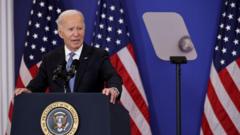The Biden administration's move to lift Cuba's designation as a state sponsor of terrorism has drawn mixed reactions, sparking hopes for prisoner releases and potential economic recovery, while also inviting speculation on future policy changes under a possible Trump presidency.
US to Rescind Cuba's Terrorism Designation in Bid for Improved Relations

US to Rescind Cuba's Terrorism Designation in Bid for Improved Relations
President Biden plans to remove Cuba from the US list of state sponsors of terrorism as part of a new prisoner release agreement, seeking to thaw diplomatic ties.
The Biden administration is set to rescind Cuba's designation as a state sponsor of terrorism, a significant policy shift that comes as part of a deal for the release of political prisoners. The White House has confirmed that an assessment revealed no evidence supporting Cuba's prior classification, a decision that could potentially facilitate diplomatic rapprochement between the US and Cuba. President Trump reinstated this designation during his last days in office in 2021, which had significant implications for US economic and military engagement with the island nation.
Cuba has welcomed the announcement, labeling it a principled step forward, albeit with limitations. The country's foreign affairs ministry stated that this change would alleviate some of the detrimental economic impacts stemming from previous US sanctions. This shift follows widespread protests that occurred in Cuba in 2021 due to deepening economic hardships, and it is hoped that this move will lead to the release of numerous imprisoned protesters.
Currently, Cuba is alongside North Korea, Syria, and Iran on this list, all of which are marked as providing "repeated support for acts of international terrorism". The former Trump administration cited Cuba's alliance with Venezuelan leader Nicolás Maduro as justification for reclassification, which Cuba described as "cynical" and politically motivated.
The implications of Biden's announcement extend beyond prisoner releases. It could signify an easing of tensions and pave the way for renewed discussions on various contentious issues between the two nations. This might also improve conditions for international business operations in Cuba, as many foreign investors and banks have faced challenges due to the existing sanctions.
In a comprehensive plan, Biden aims to notify Congress of undoing some financial restrictions imposed during the Trump era, which included revoking the right of individuals to make claims on confiscated properties in Cuba. However, as the political landscape shifts, questions loom about whether a potential Trump administration would reverse these recent developments. With his nominee for Secretary of State, Marco Rubio, advocating for stringent sanctions against Cuba, the future of US-Cuba relations remains uncertain.




















